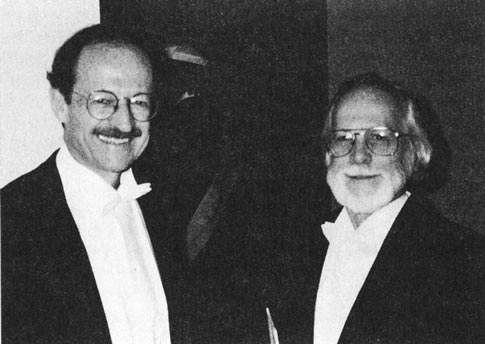
This Article From Issue
November-December 2003
Volume 91, Number 6
DOI: 10.1511/2003.38.0
How to Win the Nobel Prize: An Unexpected Life in Science. J. Michael Bishop. xvi + 271 pp. Harvard University Press, 2003. $27.95.
According to J. Michael Bishop, science is widely misunderstood, and this poses a threat to its future. If only scientists were better communicators; if only they would acknowledge the legitimate concerns of the public about their enterprise; and if only scientific efforts to communicate clearly were not muddied by ill-informed critics—then, in his view, the outlook for science might be rosier. He was thus led to write this curious book, How to Win the Nobel Prize: part autobiography, part history of science and part intervention in current debates about science. Its aims are to inspire (future) scientists, to educate the public about science and to combat science's critics. Bishop has some good points to make, but this volume sends out contradictory messages.

From How to Win the Nobel Prize.
The book consists of five loosely connected essays in which Bishop uses his life and his intellectual interests as springboards for reflection on science, the motivations of scientists and the importance of politics to science's future. The first chapter begins on the day that Bishop heard that he and Harold Varmus had been awarded a Nobel Prize for their discovery of the cellular origins of retroviral oncogenes. Bishop recounts this story to argue from his own experience that scientists do not do science for rewards such as the Nobel. The rewards should come—as they did for Bishop—as a surprise. Yet the narrative structure of this chapter could be read to work against this premise. With its detailed description of the excitement that followed the announcement of Bishop's own award, and with its history of the origins of the Nobel, the essay holds out the promise of glittering prizes as an incentive for achievement, and so undermines its own conclusion—that science should be done primarily to satisfy intellectual curiosity.
Born in 1936, the son of a Lutheran minister, Bishop grew up in rural Pennsylvania. In 1957, he entered Harvard Medical School, where vague plans for a career in teaching gave way to a life in laboratory research, eventually in molecular biology. After brief stints at the National Institutes of Health in Bethesda, Maryland, and in Hamburg, Germany, he moved in 1968 to San Francisco, where he undertook his pathbreaking work with Varmus, before merging a career in research and teaching with one in university administration. He became chancellor of the University of California, San Francisco, in 1998. Bishop traces these events in the second chapter of the book, interspersing the narrative with homespun advice to young scientists based on his own experiences. "Cultivate colleagues," he counsels; "ignore convention," "look for new vistas," "let . . . students follow their own noses," "[remember that] frenzy is the enemy of reflection," and "be prepared to take risks." This last piece of advice is a reference to his failure to pursue the scientific problems that led David Baltimore and Howard Temin to the discovery of reverse transcriptase.
Bishop is clearly concerned about the extent to which the rewards of science may corrupt the field; but he is also worried about the extent to which scientists ignore the political reality of science's dependence on public support, and the genuine anxieties that ordinary men and women have about scientific activities. Fearful of outside control, he argues against greater political influence over science, while he simultaneously urges his fellow scientists to engage with their political masters.
For him the problem is that scientists are very poor at talking to those outside their field. In his view, it is essential that scientists learn to communicate with politicians and the public if they are to enlist their support, and that they listen to and engage with public concerns about science. Ever ready with advice, he suggests that scientists hire lobbyists, and that they learn that what persuades a fellow scientist may not persuade a politician or the public.
Two chapters on the history of the research fields with which Bishop has been most closely associated—infectious diseases and cancer—give him an opportunity to put his concerns about science communication to practical effect. These histories can be read both as inspirational tracts and as popular science texts. They include stories of those whom Bishop calls "heroes," who paved the way to current scientific understandings of these subjects; cautionary tales about those who deviated from the path; and explanations of current scientific understandings of infectious diseases and cancer. Thus these chapters seek to educate, to motivate and to chronicle progress—and so, Bishop hopes, to strengthen support for science. The urgency behind his efforts is outlined in the final chapter, in which he sets out his positions on a range of sometimes contentious issues including the science wars, science education, research on stem cells, and growing public distrust of science.
How to Win the Nobel Prize can be read as an autobiography, an advice manual, an inspirational treatise and a contribution to public science education. It advocates a vision of science as a means to social progress, built on values of honesty, truthfulness, disinterestedness and intellectual passion. Bishop argues that scientists should actively communicate and engage with the outside world they seek to improve. Few would dispute the need for scientists to act in these ways. But communication and engagement are not the same as persuasion. I wonder whether the book will achieve its goal of assuaging the public disquiet that, Bishop fears, threatens science's future.—David Cantor, National Cancer Institute, Bethesda, Maryland
American Scientist Comments and Discussion
To discuss our articles or comment on them, please share them and tag American Scientist on social media platforms. Here are links to our profiles on Twitter, Facebook, and LinkedIn.
If we re-share your post, we will moderate comments/discussion following our comments policy.